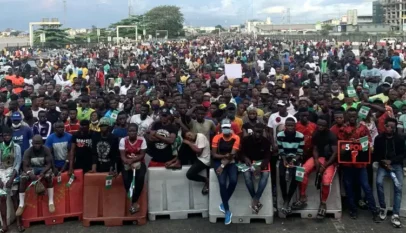Political leaders in the Middle East and other parts of the world are bracing for a much-anticipated reprisal attack by Israel on Iran for the Tuesday rain of about 200 missiles by the Arab nation on the Jewish state’s cities, including its capital, Tel Aviv.
Israel Prime Minister, Benjamin Netanyahu, had described the attacks as a grave mistake by Tehran, vowing to deliver a devastating blow in response. Iran has also in turn warned of a no-holds-barred vengeance on Israel.
The US White House also threatened Iran with “severe consequences” for the attack, with national security adviser, Jake Sullivan telling reporters in Washington that the country would “work with Israel to make that the case.”
Experts had initially hoped that Tel Aviv’s response would be mostly focusing on military infrastructures around Iran, but not its nuclear sites. But there are now new concerns Israel’s reprisal might be unhinged with oil installations and nuclear sites not spared.
The US, according to reports, does not favour an all-out reprisal, but the superpower nation has not been able to rein in Netanyahu in recent times, especially in its war with Hamas in Gaza.

Iran has also been talking tough, amidst its claim that it deliberately targeted military facilities in Tuesday’s attack, but would not be so lenient if a reprisal is launched by Israel.
“Any Israeli response to Tuesday’s missile attack would be met with ‘vast destruction’ of Israeli infrastructure”, Iran’s General Staff of the Armed Forces said.
The White House similarly promised “severe consequences” for Iran and spokesman Jake Sullivan told a Washington briefing the US would “work with Israel to make that the case.”
USA President Joe Biden said the country would back its major Middle East ally in its vengeance mission, but not on attacks on nuclear sites, because of fears that it could broaden the scope of the war and possibly draw in Russia.
The USA said it would support strikes on Iran’s oil installation, a move that could spike crude oil prices.
President Biden who was asked on Thursday if the US would support Israel striking Iran’s oil facilities, said “We’re discussing that. I think that would be a little.”
Security experts said any attack on Iran’s oil installation could lead to Iranian proxies, especially the Houthi rebels in Yemen targeting the oil facilities of other Arab states, including Saudi Arabia and Jordan.
World leaders fear that disruption to oil flow from the Gulf region could affect crude oil prices, leading to inflation in major economies around the world, including the US, which presidential election is just weeks away.
Meanwhile, Israel continues to pound Hezbollah, Iran’s proxy in Lebanon and takes the fight against the terrorist group deeper into the country.
Israel fresh airstrikes on Thursday hit Hezbollah’s headquarters in southern Beirut, with the central part of the capital also hit for the first time in 18 years, killing no fewer than nine persons earlier Thursday.

Photo: Central Beirut after an Israel airstrike on Thursday
A CNN report indicated Israel had issued an evacuation order on more villages in Southern Lebanon, in the latest fighting between Israel and Hezbollah, with more than 1,000 victims died, and about 1 million residents displaced.






































